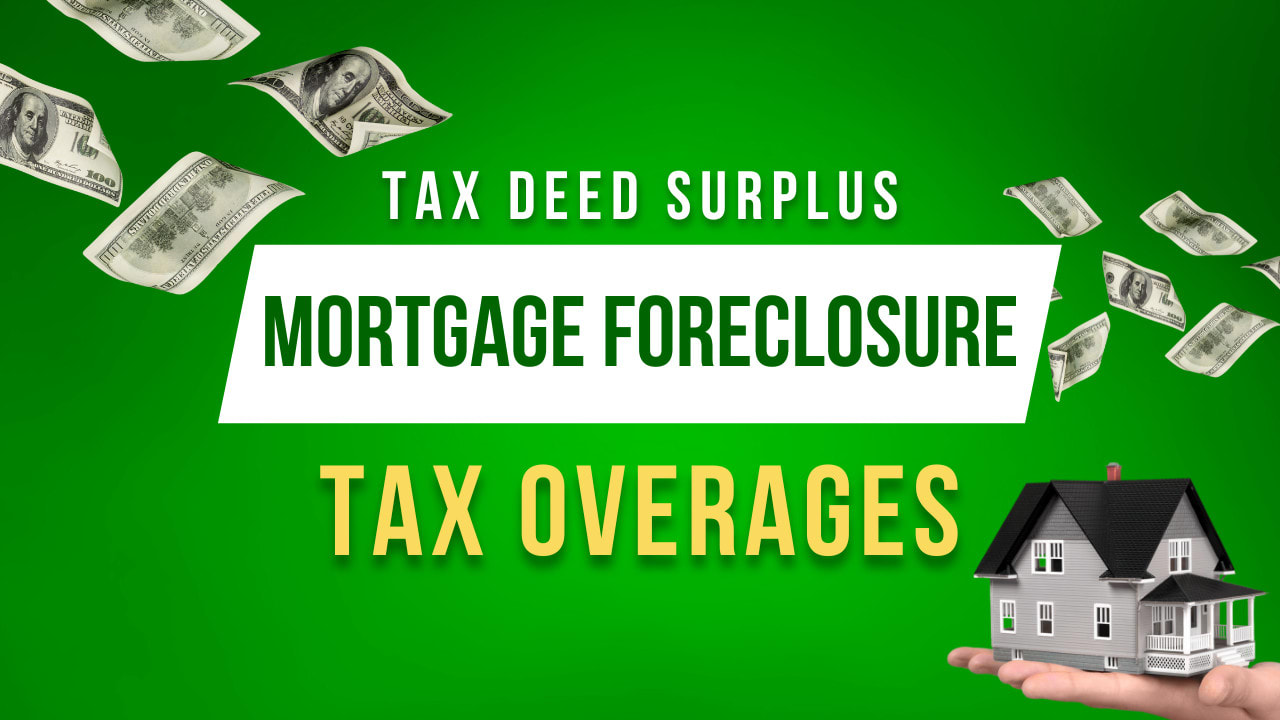All Categories
Featured
Table of Contents
Many of those property owners didn't even know what overages were or that they were even owed any type of excess funds at all. When a home owner is incapable to pay residential or commercial property tax obligations on their home, they may shed their home in what is understood as a tax sale public auction or a sheriff's sale.
At a tax sale auction, properties are offered to the highest prospective buyer, nevertheless, in some instances, a residential or commercial property might sell for even more than what was owed to the county, which results in what are known as excess funds or tax obligation sale excess. Tax obligation sale overages are the additional money left over when a confiscated residential or commercial property is sold at a tax obligation sale public auction for greater than the amount of back taxes owed on the residential property.
If the home costs more than the opening quote, then overages will be produced. What many property owners do not recognize is that many states do not permit regions to maintain this added money for themselves. Some state laws determine that excess funds can only be declared by a couple of celebrations - consisting of the individual who owed tax obligations on the building at the time of the sale.
If the previous residential or commercial property proprietor owes $1,000.00 in back taxes, and the home costs $100,000.00 at auction, after that the legislation mentions that the previous homeowner is owed the distinction of $99,000.00. The region does not get to maintain unclaimed tax obligation excess unless the funds are still not asserted after 5 years.
Specialist Real Estate Overage Funds Training Best States For Tax Overages
However, the notification will generally be sent by mail to the address of the residential or commercial property that was marketed, however because the previous property proprietor no more lives at that address, they often do not get this notification unless their mail was being sent. If you remain in this circumstance, do not allow the federal government maintain money that you are entitled to.

From time to time, I hear discuss a "secret brand-new possibility" in the organization of (a.k.a, "excess proceeds," "overbids," "tax obligation sale surpluses," and so on). If you're totally not familiar with this principle, I would certainly like to offer you a fast review of what's going on below. When a homeowner quits paying their residential property tax obligations, the neighborhood town (i.e., the area) will certainly await a time prior to they seize the residential or commercial property in repossession and offer it at their yearly tax sale auction.
The info in this write-up can be impacted by several special variables. Mean you own a residential or commercial property worth $100,000.
Optimized Foreclosure Overages List Curriculum Property Tax Overages

At the time of repossession, you owe about to the region. A few months later on, the county brings this residential property to their yearly tax obligation sale. Here, they market your residential property (in addition to dozens of other delinquent properties) to the greatest bidderall to redeem their lost tax income on each parcel.
Most of the capitalists bidding on your residential property are completely conscious of this, too. In lots of situations, buildings like yours will obtain proposals FAR beyond the quantity of back tax obligations actually owed.
Get this: the area just required $18,000 out of this residential or commercial property. The margin in between the $18,000 they required and the $40,000 they got is understood as "excess proceeds" (i.e., "tax obligation sales excess," "overbid," "excess," etc). Numerous states have statutes that ban the region from keeping the excess payment for these residential or commercial properties.
The region has regulations in location where these excess proceeds can be declared by their rightful proprietor, normally for an assigned duration (which varies from state to state). And that specifically is the "rightful owner" of this cash? In many cases, it's YOU. That's ideal! If you shed your building to tax foreclosure because you owed taxesand if that residential property subsequently cost the tax obligation sale auction for over this amountyou might feasibly go and collect the difference.
Unparalleled Tax Overages Business Learning Mortgage Foreclosure Overages
This includes proving you were the previous owner, completing some documents, and waiting for the funds to be supplied. For the average individual who paid full market price for their building, this technique doesn't make much feeling. If you have a serious amount of money spent right into a residential property, there's method also much on the line to just "let it go" on the off-chance that you can milk some extra cash out of it.
With the investing technique I make use of, I might purchase residential or commercial properties totally free and clear for cents on the buck. When you can purchase a residential or commercial property for a ridiculously economical rate AND you understand it's worth considerably more than you paid for it, it might really well make sense for you to "roll the dice" and attempt to collect the excess profits that the tax obligation repossession and public auction process produce.
Strategic Mortgage Foreclosure Overages Approach Tax Overages Business
While it can definitely pan out similar to the means I've defined it above, there are additionally a few disadvantages to the excess proceeds approach you actually should certainly be aware of. Mortgage Foreclosure Overages. While it depends substantially on the features of the property, it is (and sometimes, likely) that there will certainly be no excess earnings created at the tax sale public auction
Or possibly the county doesn't generate much public interest in their auctions. Either means, if you're buying a residential property with the of letting it go to tax foreclosure so you can collect your excess profits, what if that cash never ever comes with?
The very first time I pursued this approach in my home state, I was told that I really did not have the choice of declaring the surplus funds that were generated from the sale of my propertybecause my state really did not allow it (Foreclosure Overages List). In states like this, when they generate a tax obligation sale overage at an auction, They just maintain it! If you're thinking of utilizing this method in your organization, you'll intend to believe lengthy and tough about where you're doing company and whether their regulations and statutes will also permit you to do it
Favored Mortgage Foreclosure Overages Course Tax Sale Overages
I did my best to provide the appropriate response for each state over, yet I 'd suggest that you before proceeding with the assumption that I'm 100% correct. Remember, I am not an attorney or a certified public accountant and I am not trying to offer out specialist legal or tax advice. Talk with your lawyer or certified public accountant prior to you act on this details.
Latest Posts
How To Find Properties That Owe Back Taxes
Investing In Secured Tax Lien Certificates
Houses Sold For Taxes